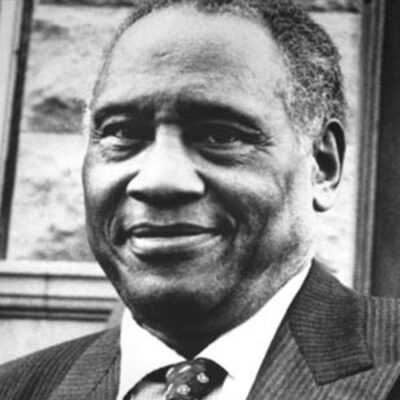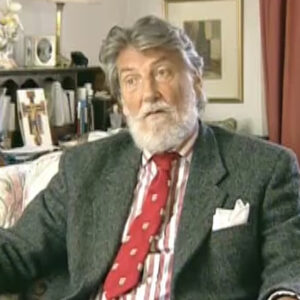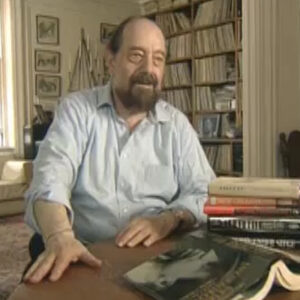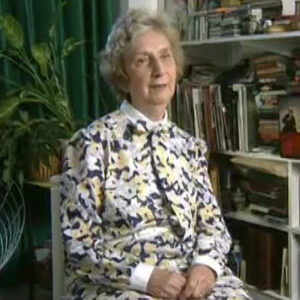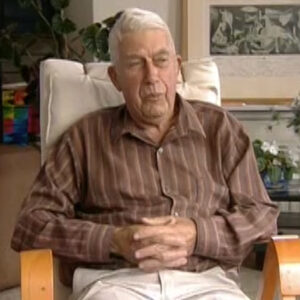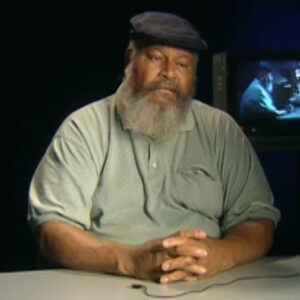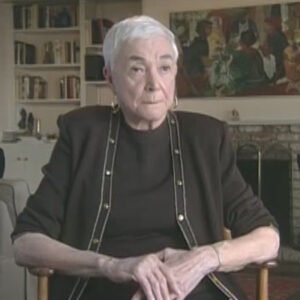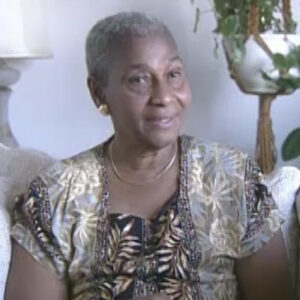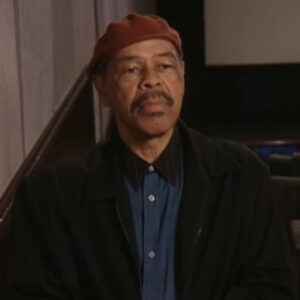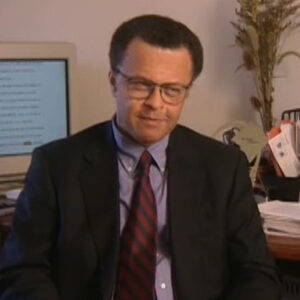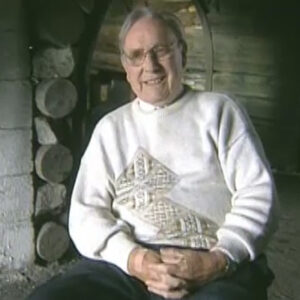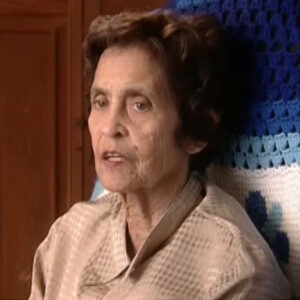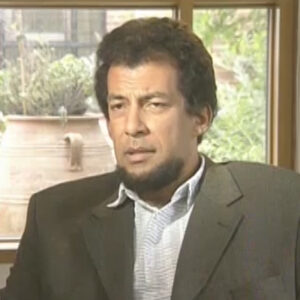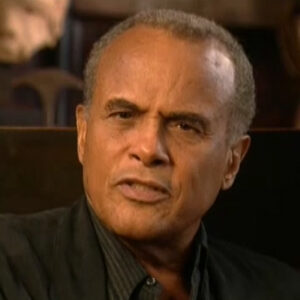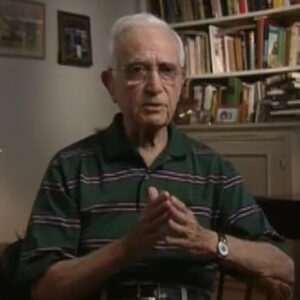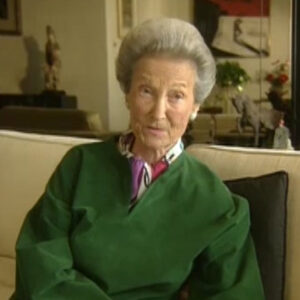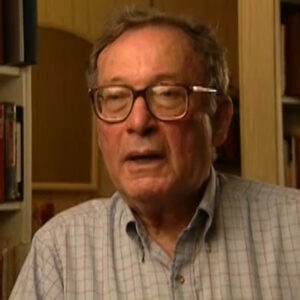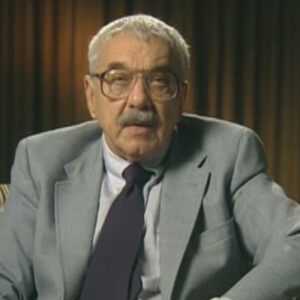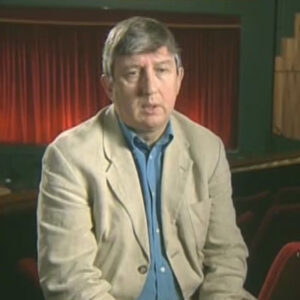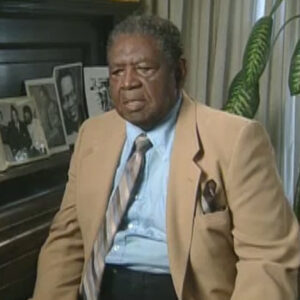Speaker I saw him twice in person once I was in the Savoy Ballroom in Harlem and I had gone there for some social event and he had been there to make some sort of an appearance. And we both happened to be on parallel lines at the coach counter. And I looked over and I did like that, not because I knew he was, to be honest with you, but he was the largest man I had ever seen. And I’m not a little person, but I just, you know, like one of his fingers made two of mine. He had hands that was so enormous. His arms, his his density, his mass was so over his head, you know, just a huge man.
Speaker And I just said, wow, you know, yeah. I want to back for a minute because I want people early in the film to tell me how long you’ve been doing this kind of work.
Speaker And, well, I started my career in Harlem radio at radio station WSIB, and that was in the mid 60s, shortly after the assassination of Malcolm. And then I was hired at Channel seven in 1967. And I nailed my job down there covering the upheavals in Newark that they called riots. But I prefer to call them upheavals or uprisings. And the following year, 1967, Dr. King was assassinated and I collective mantle of guilt fell over many areas of American society, including media. And they decided to do that, which they had never done before. And that was to begin to not only hire a few black people, but also to have black programming. And so in the local area, every station came up with a black program to four or five, seven, nine, 11 and 13. And the Channel seven version was like it is. And I had been there a year. I was doing weekend anchor work. I was doing street reporting. But when, like it is came along, I was very excited about it because it presented an opportunity to be involved with a production unit that I could have some say in. Although I was not a producer at the time, I was just co-host. The original host was Robert Hooks, the actor, and the following year he got an offer to do some obscure television series called NYPD. And he left and recommend that I, you know, become the host. Up until then, I’d been a sort of alter ego and I would do street field reports and stuff. And so very reluctantly and I it’s hard to believe, but I was not really anxious to be the host, but I did. And then in 1975, I became the producer. And then that’s when it began to come together on a number of forces, my disciplines as a reporter, my experience as a Harlemite and the continuing intellectual development about our people living in Harlem, working in Harlem, hearing the leaders who were coming through, the people who were telling me not only about what was happening today, but how they got to be that way and education that I had never gotten in school. So all these things began to come together and I infused them into like it is. And the rest, I guess, is its history.
Speaker Now, as a journalist, you have been in a position to see the treatment of black people in the media. Could you talk briefly, briefly about some of the perceptions of black point of view, white from that point of view of individuals, and then sort of way that into tropes and then we’ll go into different stages because I’m sure that it varied at different times?
Speaker Well, in my experience and media, I have seen that even with the presence of black people as reporters and doing anchor work, final decisions are still in the hands of people who are neither black, brown, red or yellow and many people of color getting jobs. And this is this is a first generation experience for us, because up until then we were working in black radio. That was it. So to move into the big time and start making some serious money, this was something that. Was new to us and it was very you know, the few of us who got in, so it was very exciting and it was something that nobody wanted to relinquish. And when you get into a job environment such as the big time being broadcast, or rather you find out very quickly what the pace is, what the rhythm and what the ethos is, and you either fold into it and become a part of it and you know, the whole thought process or you don’t. So I think that and that’s a truncated way of answering your question by saying that I saw even with the presence of black people, this prevailing control of imagery. All right. And many blacks, as I said, found it very difficult to go against that because they felt, and rightly so, that it might injure their their career, their future right now editorially.
Speaker How does that play out?
Speaker I mean, let’s let’s take, for example, Paul Robeson, let’s say during the, uh, during his later years, let’s say. Yes. Which is when we sort of media, you know, how to use the black press, treat him differently from the white press. And how did you perceive that to be?
Speaker Substantially, the black press are really rose to his defense, gave him a platform, allowed him to speak up, gave him editorial support, gave him reportorial support, gave him the kind of coverage that he wasn’t getting from the white press. Paul Robeson caught it, so to speak, because he was taking America to task.
Speaker And again, it’s a thing you’re not supposed to do that if you have made it and he had made it. And so he was viewed by many, including the lions in media, as being an ingrate.
Speaker You know, he wasn’t you know, he wasn’t grateful for what had happened. And on top of that, he was talking in an era where there was McCarthyism and there was concern about communism. And he didn’t sectarian ize his his condemnation of racism. He saw it as a global phenomena. He had been to England where he really began his career on the stage and major proportions doing Othello. And he was exposed to some very important scholars in England and some leaders, Kenyata and and in chromo and many, many others. And that begin began to influence his thinking. And what they were telling him, what he was learning was the global ness of racism and colonialism and oppression. And so when he began to speak up, he began to threaten, or at least many power institutions viewed as a threat, viewed it as a threat to their agenda, their plans, what they had in mind for globalisation, which, of course, is right in our laps today.
Speaker And he was an interventionist. He was an obstructionist. He was telling the world from the concert stage about this this as he perceived as an evil. And of course, that’s when he really began to catch it.
Speaker You know a lot about him in the beginning of his cultural career as a concert singer. Yes. He seemed to get a lot of good press even in the white press. I mean, is that is that correct statement?
Speaker Yeah. I mean, they’re the newspaper headlines of him and his prowess at Rutgers. There was always an interesting spin. They took, you know, this dark presence that thundered down. And it was very interesting how he was depicted.
Speaker But nonetheless, he was viewed there was really no option because there he was and he was mowing everybody down as a great, you know, as a great athlete. Then when he started to do spirituals, that was OK, you know, I mean, he’s sometimes I feel like a motherless child and water boy and or who could argue with that? It was only when he began a little later on to broaden his thesis and began to take those spirituals and say, now, this was just not some, you know, moaning and, you know, complaining people. These were people who were using their culture. Or product as a as a signature for struggle and resistance, and he began to talk about that. That’s when it became difficult. So in answer to your question, I think at first he was a darling. He was a darling. He appeared on radio programs. He did a program. There was a still photograph of him with Raymond Massey, the actor, and he was very, very well received. There was a huge birthday party in his honor at a regiment armory in New York City. And everybody was there, Jimmy Durante and a whole lot of people were there. He was really looked up to and people call him a credit to his race. And it was at that event event that Mary McLeod Bethune called him the tallest tree in our forest. Beautiful. So from the jump, as we say, in Harlem, he was viewed as, OK, he was fine.
Speaker And I suppose the black press was happy because he was doing what he.
Speaker Yes, yes. Because not only was he a star performer, but his powers of articulation, he was such a presence when that man walked out on the stage. I remember living in Harlem and my father, who’s Jamaican, and he and my mother was also Jamaican, went down to Broadway to see Othello. And coming from a Jamaican upbringing, he knew his English ness. He knew the Bible, he knew the English literary lions, and he knew his Shakespeare backwards and forwards. So when he went down there and saw that when he came back, he couldn’t speak, he was absolutely overwhelmed.
Speaker He said he’d never seen a man with that voice and with the diction, you know, he won the diction award. And that’s something that is not often often conferred on an actor. My father was blown away.
Speaker I remember him, you know, just saying he’d never been through anything like that.
Speaker And to hear my father say that because my father was some kind of man.
Speaker So for him to say that about another man, you know, the man as bad as we say, um, what was I know that there was some controversy when he began to add European songs to his repertoire.
Speaker And I know in the black press there was a bit of a discussion that you and your research did you read that and you?
Speaker Well, I think at first I’m not too concerned about the white folk, you know, inclusion in his presentation.
Speaker But I know that as he began to talk about better treatment for black people and talk about socialistic approaches to government and society, that’s when he began to catch it.
Speaker There were some movies that he did that civil rights organizations were troubled by. He did some movies and they thought he was a little and he himself agreed. And Sanders of the river, he picketed and he was the star of the movie.
Speaker Yeah. I mean, what was interesting to me is that as you read the black press, I mean, there’s a wide range of opinion in it about different things that he did like. I mean, we did notice that when he added European songs, some people said, well, why are you abandoning us?
Speaker Mm hmm. Mm hmm.
Speaker And and the white press said, oh, well, he’s he’s you know, he’s he’s broadening.
Speaker He’s he’s more universal.
Speaker And let me I said I think we know the answer, but I want to use it. Why do you think there’s these two approaches to this one person, to this one phenomenon? I mean, because consistently, you know, up to the up and then it kind of gets a little fuzzy. There are really two distinct approaches in the press about this guy from the white press and from Chris.
Speaker I mean, what I mean. Well, we didn’t we didn’t have many heroes then. We had Joe Lewis. We didn’t have Jackie Robinson yet. Lena Horne was still, you know, maturing as a presence on the stage. Ethel Waters, Rochester, a few things, but nothing like Paul. So we were you know, we were very proud of this man, just his presence. Again, he had an awesome presence and he was a source of great pride. And I think that up until that point of which you speak, I think that white people. We are glad to see this kind of a person, you know, he he didn’t raise a hue and cry about not being on water camps all America, about being excluded in the Hall of Fame. You know, there are only ten people mentioned on the starting team of the All America when he wanted. He didn’t jump up and down about that. He was sort of quiet when he finished law school at Columbia and he went to that law firm in Wall Street. And the secretary didn’t take dictation. He didn’t jump up and down and raise a stink. He just moved into another pursuit. So he was not a rabble rouser, persay then. So I think up until a certain point, he was very, very comfortable. You know, he was a credit to his race. You know, he was something that everybody could be very proud of, including white America. He didn’t complain a lot about performing and under segregated conditions at first. But, you know, Paul Robeson, in my humble opinion, which is very humble and very limited, I would say that he did not start his career at 90 miles an hour.
Speaker It picked up momentum. The glorious thing about this man is that as he met more resistance instead of decelerating, he accelerated.
Speaker Yeah, that’s a good idea. We don’t have that. That’s a good analysis of his being a good guy until a certain point.
Speaker I’ll tell you that the thing that you know, the thing that I notice also is once you get black players involved in trying to rein him in, like Jackie Robinson for a minute, like the NAACP, then it really gets complicated.
Speaker Yeah, people are. So now, from a media point of view, how does that play out? I mean.
Speaker How did the black press deal with Jackie Robinson when he said, I thought that what Mr. Robinson said was silly and what did the wife say or how did they both react to that?
Speaker Well, you know, I’ve looked at that clip of Jackie Robinson’s statement. I’m not clear whether he volunteered or whether somebody asked him to volunteer. Somebody told him to volunteer, but he had just broken in and he himself was a star. Anyhow, he and Rachel ended up in Washington, but the clip shows him saying if this is what he really said, and then there’s a cutaway to a listener and then it comes back and says, well, it sounds pretty silly to me. I’ve never seen and you and I deal with this business called editing. I’ve never seen the straight cut. And so it may be that what Jackie really said is not what we heard him say. You know, editors have a way of doing those things. And so I’m not it may not be true, but I do know that Jackie, whatever he did say, it was not laudatory of Paul. It did differ. But I think he had more to say about the discussion because Jackie was no lightweight. He was an intellectual, intellectually competent person more than the average. And so I don’t think he was an ill considered man. And I think that while he may have differed with Paul Robeson, I think he had another context that was lifted out. Now, sometimes that kind of editing is done in the interest of time.
Speaker And then sometimes it isn’t.
Speaker Well, how did that play out? I mean, what was your how did the black press deal with Jackie, one of our heroes jacking up another of our heroes? How did that play out?
Speaker I think that people really rose to Paul Robeson’s defense. It wasn’t the first time. I mean, Don Newcome soon after had that legendary confrontation in the Red Rooster.
Speaker And black people rose to Paul’s defense when Newcome threatened him physically. And you know, the story that Jimmy Hicks told. I’m not aware that I’m reading any editorials in the black press castigating Jack, because you have to remember at the time, McCarthyism had everybody back it up. Now we can look at it for what it was. But in those days, I mean, being called a communist was really very serious. And even black people in the black community were afraid of it. Dubois had been pillaged by this by this label. And a lot of people viewed in our community viewed communism as something, you know, commensurate with leprosy and, you know, whatever. It was a bad it was bad to be a communist.
Speaker So I don’t know if I’ve answered your question.
Speaker I was good that in terms of Paul’s overseas activities, like becoming a star in England, especially the Spanish Civil War stuff in the late 30s, did the black press really give that any play or, you know, once he was out of the country, they just forgot about him?
Speaker Well, I can tell you, I have pursued our collective story like. Like a Trappist monk. Really, this is my life story and I’ve pursued Paul Robeson in particular his story, and I’ve done many documentaries on him, 99 percent of the footage has come from overseas. Paul Robeson himself said that he has never appeared on American television as an artist. There’s, I think, one clip of him coming out of the State Department when he won his passport back. But I have seldom seen any, if any, other footage of Paul Robeson. So the attention that he got by the media was overseas where he was lionized. But over here, there was nothing. It’s hard to believe, but he was never invited to appear on television. And even Eleanor Roosevelt, as you know, had a radio show and she canceled her invitation to him. So I think that in our collective ignorance about socialism, about communism, in the heat of the moment, and I have to keep emphasizing this because after the fact, it’s always easier to look Monday morning. It’s always easier to look at the play that didn’t go right. But when you’re in the middle of it, those are very confusing times for us. We didn’t know much about our history. We didn’t know much about globalization. We didn’t know much about colonialism. We were embarrassed about slavery. We were embarrassed about racism.
Speaker We got around these things. We didn’t confront it and comment. Communism was something that we knew. We were told very clearly that we had to avoid.
Speaker We weren’t working on Madison Avenue. We were not, you know, in media. We were outsiders. And so what Master said we went along with and if Martha said that communism was wrong, then communism was wrong. So when somebody like Paul Robeson came along with a whole different commentary, it was intimidating. Now, it would be comfortable perhaps to me to say that that isn’t the case. But the truth of the matter is, a lot of us ran scareder from Paul when he was taking these stands and then talking about socialism and Russia.
Speaker Why nobody has said it as completely as that. People have danced around that. Yeah, but it’s true.
Speaker I mean, I and I think the press seems to reflect that either by ignoring them or just. Yeah, yeah. Which is why, I guess is why I had to do his own book, stuff like that.
Speaker That’s why he had to say exactly where I stand. I mean, he he found it necessary to really make his case for himself because he found that he really wasn’t getting it. I don’t think that our motives were the same as the white media. White media is really business focused at its base. And so many of the editorial postures that you see that media takes, in my opinion, has is not immune and is not a part from business and political concerns.
Speaker It’s funny I should say this in these times, do you think even during the height of the, you know, the Cold War and stuff, when they were just I mean, they were I mean, I’ve read some white editorials. They’re just bitter against this guy. I mean, hard now. It seemed to go beyond just business. I mean, it seems to be highly personal. Do you think that there was an element of slapping down on unruly sleeves?
Speaker You know, somebody he was a disappointment. You know, it was like, how could you how could after all we’ve done, you know, as close as we’ve been, we’ve rolled around, you know, in the bed together. How could you get up the next morning and say that about me? You know, how could you say that? So there was a wounding process, you know, like Jimmy Baldwin said, like wounded lovers, the French and the Algerians. How could you have an uprising as close as we’ve been? And so Paul, who had been so closely embraced by Uncle Sam, all of a sudden he turned on them. And so there’s great disappointment, great pain, which in many instances turned to anger, of course, not so much because he was criticizing racism, but he began to talk about colonialism. He began to stand up for the colonial peoples of the world and the struggles in Africa. And at that point, there was great concern because Paul. And his whole aura and all of his commentary began to really be loud and clear at the time when the Congo was in flux and Ghana had just, you know, risen up and there was fervor in the Caribbean. There were uprisings and, you know, there was some business interests that really didn’t want to hear that. So when Paul Robeson started talking about that, as visible as he was, there was not only a hurt, but there was also an anger because you’re now talking in a way that changes my my wallet.
Speaker Yeah, that’s a good point and that’s a good analogy for a lover.
Speaker Yeah, I mean, because they really did get into woman and then they just I noticed it was like an invective of some of the stuff they wanted during the Cold War.
Speaker I mean, they just it wasn’t just about business or something personal.
Speaker I always thought, yeah. And the irony is that Uncle Sam and Russia were in bed together during World War Two.
Speaker They were kith and kin. So at some point when Paul began to visit Russia and whatnot and performed there, not an eyebrow was raised. But then after that, the Germans were put out of commission and the war was over.
Speaker Then they became a squabble over the spoils. And that’s really when it hit the fan and the major power outside of Uncle Sam was from Russia because the European nations had become depleted and ravaged by bombings and the whole war campaign, Uncle Sam was immaculate. No bombs had landed here. And so everything was intact here in this country. And the only thing that opposed Uncle Sam’s interest was the Soviet Union. And that’s when they got it on.
Speaker Uh, can you. Are you aware of any black press element or black press writer or newspaper that dealt with issues the way you just ran it down?
Speaker Are you aware of it?
Speaker I mean, I’m wondering if the car remember when he went to his defense, to his article in fifty one? I think it was the year when when um.
Speaker Yeah, it was in 2001 in Ebony as Paul Robeson betrayed that ego and basically said, no, he’s good. And I don’t know about that.
Speaker No, I didn’t see that article. But I think, though, that at at that era, our focus was still civil rights and civil inequity.
Speaker And Paul had taken it to another level. And I don’t think many of us had were on that level, with the exception of Dubois, Dubois was right out there and he said, uh, well, in terms of analyzing the white press, one, would you say I mean, you can’t get the one.
Speaker Would you say in terms of his whole career when they began to turn on him?
Speaker I think when he made a deliberate move to partition audiences up front for poor, poor people, he wanted to have seated up front at reduced prices and have the wealthy people sit further back. And he would say so from the concert stage. It was a pre condition for his contract. He went out of his way and that was the signal, I believe, that he really had made a decision as to what kind of a performer he really wanted to be and was going to be that he was going to use his instrument as a weapon for change and for confrontation with wrong. I think that that was a clear signal, the Spanish Civil War with the loyalists. Yeah, I think that that was also but then, you know, he was all over the place. I mean, he was involved with that lynching. And that may have also put people off because he confronted Truman, they picketed the White House and a delegation of picketers went into the White House and talk with Mr. Truman. And the president said that he was not prepared to do anything at the time. And Robeson said and it’s a quote, If you don’t do something about lynching, we will. Well, now you don’t talk like that. You know, as an entertainer. I mean, who are you? And so a lot of people began to feel that he was moving out of his britches. You know, that there was a stereotype role for black and white artists.
Speaker He’s supposed to play ball even with the U.S. hearings. Mind you, there was an actor, a grade B actor. I can’t recall his first name. I think his last name was a Reagan. He didn’t hesitate to badmouth and accuse some of his fellow actors as being communists. Robert Taylor, you know, he also John Wayne, a lot of people really turned on, not because they were really concerned about the comment, but because they felt it expedient for their careers. They had been given some they had gotten some sort of pressure and they caved in.
Speaker And so here comes Paul Robeson, who when he was invited to testify, he didn’t back down. You know, I mean, he opened fire on them.
Speaker So I think I’m getting around the place because it’s difficult to really pinpoint there’s not a day or a demonstration or a particular hinge. I wish that I could identify that, but I don’t I’m not able to. But I think also his involvement with Einstein and going over to the Paris peace conference at the behest of Dubois, his challenging baseball owners about opening up the major leagues. All this happened in the same era of the forties around there.
Speaker And he was out of line. He was definitely out of line. And even though the game has changed a little bit, it’s still pretty much. The same.
Speaker Um, the.
Speaker No question of that. But let me just go to this, what is often said is that from that time that you just mentioned.
Speaker To almost now, a hundred years since the day centennial that essentially was like written out of history, deliberately made the general history that our history. But would you say that the black press has gone along with that or that they were one of the people you can kind of point to, the kind that kept is somewhat limited reputation.
Speaker And how would you all know they began to cover him? They gave him a good editorial run on what he said to Hugh Black. They ran his comments in full. They began to cover him at churches, which was his only venue to perform when everything else was close to him. He the black press, I believe, really rose to his defense. Mind you, black and white media was didn’t exist.
Speaker So black journalists were working for black papers.
Speaker And they they, you know, went after Paul and applauded him and supported him with few exceptions. A few exceptions.
Speaker How how do you what’s your take on the fact that 30s and early 40s, he was really getting socialist, that he was moving, he was staying, as you mentioned, and then in the World War two, he becomes like a bond seller.
Speaker I mean, you know, he appears with stars. He’s very patriotic and he redefines patriotism a little bit. But and he was considered good. And how does that media was how did how do you become an enemy of the state and then become a good guy? How does that work in media terms?
Speaker Well, you know, during the the American Revolution, many slaves fought with the colonies against the crown, thinking that if they did that, they would win their freedom.
Speaker And the British troops, when they found out, found that out. They began to hit on the slaves to come and fight with them against the colonies. It happened in World War One and it happened in World War Two. Many felt that if we put our shoulder to the grindstone and fought fascism, then America, which was essentially misguided, not evil, not inherently corrupt, irreversibly.
Speaker We just thought and I really have to qualify that because I can’t really make that broader statement. It’s not it’s not fair. But I think that many of us felt that the United States was misguided and that if only it was shown it’s the error of its ways that it would turn around and say, I’m sorry, you know, how could I have done this?
Speaker Of course, we want you to be equal, you know, and respected in the society.
Speaker And so it was that spirit that I think caused a lot of us to be champions. Joe Lewis was did boxing exhibitions and a lot of people, really black people got involved in the war effort. And of course, Paul Robeson became a champion seller of war bonds because he really felt as as I said, so many felt that if we really contributed to defeating the axis, that justice would then turn around and be meted out to us.
Speaker And the media seems to have reflected that, I mean, both white and black. Oh, yes, yes.
Speaker Remember Joe Lewis when he was at a war rally at Madison Square Garden? He said, we’re going to win because we are on God’s side. Place exploded.
Speaker You know, Jimmy Cannon said he’s a credit to his race, familiar, you know, all of a sudden, you know, black people who would say that we’re really adored. And I again, I’m talking now in hindsight. In retrospect, we didn’t know then what we know now about America, we and our history books.
Speaker We didn’t know what America was really about. We didn’t know what the colonies were about. We didn’t understand colonial America. We didn’t understand the whole formulation of this country.
Speaker You sure didn’t learn it in schools, be they white journalists or black journalists we learn today and plain bad English. We don’t learn anything at all about our history. Journalists don’t have to learn anything about African history. And yet they, you know, go around the world and cover African events without knowing how things came to be that way. It was much worse then. So I think that was reflected in the attitudes of the media who went through the same schooling that we all did.
Speaker Two things, uh.
Speaker Can have some gin. Yeah, go ahead.
Speaker Um.
Speaker Robeson’s private life was, you know, quite filled with ladies, you know, but and it was known, but it was never really reported in the black press was more reported than the white press. I mean, I’ve seen articles. Where’s Paul? He’s living in a hotel as he’s in that kind of stuff now.
Speaker I mean, what’s your take on that?
Speaker I mean, the whole thing now of private life versus public life is very much in the news. Like it’s in the headline.
Speaker You notice a little bit.
Speaker But I mean, it’s you know, it was actually you could read more about it in the black press, especially during his early stardom, celebrity days than in the white press and.
Speaker I mean, what’s your take on that?
Speaker Well, I think that if you look at Paul Robeson and you hear his voice.
Speaker It’s not difficult to believe the argument that women throw themselves at him. I am sure he fought valiantly against the onslaught and with all due respect to this man, I think it could have been much worse than whatever it turned out to be.
Speaker We’re all fresh out of stones, you know, and it wouldn’t be right for me to even begin to really find fault with his behavior.
Speaker But did the black media get into it? Never took the salacious term tone that we look at today and never got into that. It might have been who he was seen with or where he wasn’t, and maybe gossipy kind of stuff, but nothing, nothing. But I think that Paul was a very attractive man. I don’t think I know. I mean, look at this man. He was absolutely magnificent. Sculptors sought him out to do his physique and all of that stuff. His voice is just overwhelming. And so women, there’s a story about his involvement with one of his co-stars. And yeah, so and I don’t think that he was always the aggressor. I’m sure that he was. And I think that he was he was, as we call, hit on.
Speaker You know, we have a woman in London just we don’t care. We just said he was big, he was black. And I love that she just went off, you know, so but when I was interested in is, I would have thought that that’s that’s an area that white journalists might have gone to just because there’s that whole way to undercut, you know, reducing to a sexual object. They didn’t do that. And I was wondering why they had.
Speaker No, I don’t. It’s very interesting, though.
Speaker They were kind of respectful until you’re right.
Speaker Until you started think although there was a big to do about Othello on Broadway, big to do because he put his hands on this woman and killed her on stage and they kissed and all that stuff. So there was a big to do about the on stage. There was not a lot of coverage about the offstage relationship, but even the onstage thing, you just didn’t do that.
Speaker I mean, years later, Harry Belafonte did a TV special and I think it was Julie Andrews and she put her hand on his elbow, just touched his elbow. And the station that aired it went ballistic. So for him to be so magnificent and so appealing and to be putting his hands on this woman on stage and killing her every night, that was that was really difficult.
Speaker OK, basically because of what he has, uh. The two quite low frequency.
Speaker What was your take on the white media? When my wife made his interpretation, when he got his passport back. And did it different for different different from the black press?
Speaker Yeah, he still carried the commie label. There’s a the one clip that I’ve ever seen taken of Paul by American newsreel was outside of the State Department. He’s standing there with Lloyd Brown.
Speaker And you can see that he was being baited by some reporters about when he was talking about friendship with the Soviet peoples and whatnot. And he said, yes, that’s right. That’s right. You know, he was really so I think that he was attacked right up to the bitter end on this whole thing about his being a commie lover and all of that. Even though he was successful in court, I don’t think he ever escaped that he was able to work again and whatnot, but he never was really let off the hook for having that stand. And I must say that. And if I can just throw this and I think one of the hallmarks of this man’s remarkable story, few of us can really hope to embody the broad array of talents that this man had. But I think it’s all within us to have the kind of. Testicular.
Speaker To be able to stand up for what you believe in, no matter what the price. This is a day of pragmatism. And it’s a tragic error that when Paul Robeson is a beacon and that he really set an example that no matter what the price, some ethic is worth standing and paying the price for. And I think that’s something that we could all benefit by. It’s tough because money is God here in this environment, in these times. And money is definitely collected, connected to the kind of person you are. Paul Robeson walked away from that and made a deliberate choice. It wasn’t an artistic choice. It was a human choice that he made. And I that is what really is a hallmark of his life. And if our young people could only hear that story of a man who had it all. And would not undress.
Speaker He kept his as his ethical garments on, he wouldn’t take his clothes off for anybody. That’s something I think we could all benefit from.
Speaker But I digress. I’m sorry, but I like the clarity.
Speaker That’s a great that’s a great well, that’s a great work ethic.
Speaker I’m going to hear it from from now on, uh, the wireless campaign.
Speaker I don’t know how much you know about that money. Some. Yeah.
Speaker Uh, Ben Davis also.
Speaker Yeah. That whole era was kind of strange because it didn’t seem to break down in black or white persay. I mean, that’s right. Now, what role the black first play in that. I mean, the fact that he was pushing for a white guy, did they go, hey, what are you doing out of that?
Speaker Well, I mean, there was great optimism. There was a labor movement in this country that had really gathered momentum. The civil rights movement was beginning to germinate. There was a whole Wendell Willkie and his one world philosophy.
Speaker There was a beginning of a change in this country to really try to refashion a more democratic environment. And Paul Robeson really got on the bandwagon in support of Mr. Wallace because he really and truly believed that his philosophy was something that would really benefit America. He caught it. He caught it, and he got a pinko label on him even more than it already had been.
Speaker And the first thing I thought you were that.
Speaker You mean as far as a black man campaigning for a white man in the black press, for example, would be I mean, there was no other option.
Speaker I mean, who else are you going to campaign for an all black candidates in those days? So it was a matter of campaigning for the best of the lot, you know?
Speaker As I said, there was no what were the options for black people, so it wasn’t so bizarre unto itself for a black man to be supporting a white candidate, but it was a political, you know, the political belief that was really called into question.
Speaker And from your readings of the black press, pretty pretty much call it that way. I mean, analyze it that way.
Speaker Yeah.
Speaker I can’t in all honesty say no, I really don’t want to Half-Step because this man’s story is too important and I have too much respect for it to really hypothesize where I’m not. I’m not clear. Yeah.
Speaker I have to go back on that because I was that’s a good I was trying to figure out. I mean I know that a lot of the urban papers supported Rose and they reported on Robeson, but whether they went with them. All the way to Wallace, I don’t know.
Speaker Yeah, Wallace was a real liberal. I mean, he had very liberal policies that were even went beyond socialism.
Speaker He embraced Robeson physically in public. I mean, he welcomed his support. And it was more bizarre for a white man to accept such strong, visible support from a black person.
Speaker That was really incredulous because black you know, we were sort of in the background, but he said, yes, people come, you know, and stand up for me. And if that picture of the two of them, you know, embracing and that was unheard of, you didn’t see too much of that. Yeah.
Speaker I finally tell you what’s been in more contemporary times. What has been the reaction of the public to your films and what are the things that have struck you about that? I mean, the people say, oh, I knew about them or I didn’t know about them or, you know, I mean, did you get Jamm for trying to do it?
Speaker And what was what was the overall and I’ve seen, too, that you that well, you know, all roads lead to Pearl Jam.
Speaker And I wanted to do the story and I met Pearl Jam and we struck up a friendship which survives to this day. I view Pearl Jam as an extraordinary man because he has chosen not to exploit but to advance his father’s story. And I have the deepest respect for him. It’s not been a perfect road, but then who can say anything? But as far as his integrity, I was there from the beginning when the Paul Robeson archives was founded on fifty seven straight across from the from Carnegie Hall. And I watched him wading through those papers and all of that stuff. He guided me. So I think that he has to be given credit.
Speaker He gave me insights that I didn’t have. He led me to sources overseas, the footage. He motivated me to move on my own to get more footage about this man.
Speaker He gave me audio of his father’s performances and and he gave me an education that is invaluable to me. Now, in answer to your question about what was the audience reaction on a number of levels. I got some people who had been sort of laid back, had been sort of cowed by the McCarthy era and all of that. And they just, you know, laid out. But they came forward.
Speaker The old soldiers came out and said, you know, how good it was to see Paul again. And there was some very emotional responses. Young people, I show them we have interns who work here. It like it is. And I make sure that they see the tallest tree.
Speaker They didn’t even know the man lived. And they are angry. They’re angry that they didn’t know enough about him because he was so huge, it’s like saying you didn’t know there was a pyramid, you know, I mean, how could you not know that? And if you don’t know, then why didn’t I know that there was a pyramid or they were pyramid, that this man was bigger than a pyramid? And most of our young people to this day do not know his story. And when you tell them the story of Paul Robeson, if you’re able to do it and that takes some doing because there’s so many dimensions to this man. But if you tell the story, even in cursory terms, I think you’ll be met by anger. On the part of young people, because they feel that they’ve been had, which indeed they have. They’ve been had that anger. Oh, yes, deep anger that they didn’t know that this large a person was never mentioned in school ever by any teacher in sociology, history, government, whatever it is, it was never they don’t know that he existed. And so to tell them about that really has made some of them quite angry.
Speaker No, I mean, that’s not the singular response, right, but it it speaks volumes to them about what we try to teach them here as interns, about how perspective is all important in reporting and in journalism and in writing. And it’s not so much what you say as it is what you don’t say. It’s not that you lie about somebody or some people. It’s just what you don’t say, what you leave out, you know? And so they’ve just left out this mountain of a man and they feel it’s wrong because he was a forerunner to the civil rights movement. You know, and they don’t know about him, then who else don’t I know about, you know, who is he? You know, and it puts him on a whole, you know, mission to find out more about these missing major steps in history. Paul Robeson is so large.
Speaker I mean, I was angry about the treatment of the American media against this man. I’m still angry.
Speaker So, so and reflecting about the role of the press there for.
Speaker I mean, hearing you talk now, the one thing that you said that strikes me is that you said it’s very much a business and therefore, if he’s not good for business, he doesn’t get in. Yeah. You know, yeah. But it also seems to me that this is a little more than that. I mean, you know what I mean? Because you can always spin that. You can spin people around and make them kind of less threatening. Right. But they have really just jammed pretty consistently. So I’m wondering.
Speaker Uh, sort of an abstract question, but.
Speaker Why? Why does the white media just basically still try to ignore him and what he represents and to a lesser extent, bloods tend not to do that and they’ll go out of their way. So what does that say to you as a long time participant in media?
Speaker It’s an abscess that perpetuates itself. If you absent. A certain facet of history.
Speaker You don’t have to after a while, it has its own momentum, so the educational system, as it was sculpted, excluded a certain kind of person or made a certain kind of rebels and justice, a deranged person, Nat Turner, Denmark Vesey, even Douglas, all these people were viewed as, you know, extremists and whatnot.
Speaker Malcolm X later on and whatnot.
Speaker But I’m saying that if you begin to paint these rebels as deranged people, then after a while you don’t have to do a deliberate and deliberate deliberately anymore that people will just.
Speaker I mean, the whole educational system, without even thinking about it, will just hurdle certain avenues. I don’t think that people sit down and and smoke filled rooms and say we’re not going to put him in the curriculum and we’re not going. It’s just instinctive. I never thought of that. You know, it’s not. You know what I’m saying? So now I think today there’s no real improvement. I don’t think that there’s much that’s being taught about Paul Robeson today or what that was all about. What was he really talking about? What was he really standing? What was he struggling against? Where does Paul Robeson stand fit in with sweatshops today? What is what he was talking about fit into the struggle in South Africa? You know, what is the connection of what happened in Jamaica? Much less here in this country, so I think that.
Speaker If you set the scenario well, the scenario will just act out on its own and perpetuate itself. You know, if you tell if you tell a light skinned black person that they’re good looking, if they have gray eyes and straight hair, after a while, they’ll believe it.
Speaker And their children will believe it. And after a while, you have a community of people who think that the best looking people are those with blue hair and nice features and yellow, you know, and ugliness as thick lips, you just can’t think of somebody ugly, as we would say, features like Mary McLeod Bethune or Louis Armstrong.
Speaker We’ve been taught that way. Now, what I’m trying to say in a feeble way is that we were just nurtured to really our hurdle that both blacks and whites in this country to just hurdle a certain kind of beauty.
Speaker I don’t know if I’ve said that, well, it’s is the kind of thing on your desk.
Speaker Oh, yes. Cottagey Watson.
Speaker Yeah, yeah, we still got it.
Speaker OK, I always do. Is there anything you want to say?
Speaker Yes, I think that. It’s not revelatory to say that black men are singled out. As a as a target and always have been I have always been fear because of our physical strength and whatnot and. The outgrowth of that, one of the outgrowths is that it’s very difficult for us as black men to really define ourselves. To to have a compass.
Speaker And a clock and, you know, a trajectory in life, it’s very difficult to be men. It’s difficult to be protective of our family and our women.
Speaker It’s it’s difficult for us to protect ourselves and income has nothing to do with it. I’m speaking now about now about myself. I just think that it is very, very difficult for us to define ourselves. And I think that Paul Robeson, what is missing in this story and is not really focused on a lot is the tremendous pressure. That he was subjected to within his social media, within his family, perhaps about his manhood, because he paid a tremendous price. And his personal relationships to pursue his career and to pursue his political bent, you know, the demands that were made on him, the challenges that were made, he was he was a well considered man and he would think about things. And he was constantly being challenged and questioned and not given the kind of respect, even when he was a star, he would that he was deserving of. And I think that this is something that all black men are subjected to. And it is amazing that Paul Robeson lasted as long as he did. And was as effective as he was given the hell that was heaped upon him, because many of us cave in, many of us capitulate, do so out, drop out, you know, punk out. It’s amazing that this man was able to last. And ultimately, of course, it caused him to have many emotional problems. I think it was his unrelenting, unrelenting hammering that he was subjected to that we all are. It was just more concentrated. So I think that we need to talk about that. What does it cost a man? A black man? To make this kind of stand, you know, what happens in your personal life, I.
Speaker I don’t know how true this is, but Mrs. King. Is reported to have said when she heard that her husband was shot. She was reported to have said now nobody can have. Now, wasn’t there? This is rumor, but if it’s true, it speaks volumes, you know, about the the pain that she. Suffered because she didn’t have a husband.
Speaker You know, he was not only fighting wars with wrong, but he was fighting wars within himself, within his own Kadry, you know, he was it was a terrible thing. And so Paul Robeson’s life, I think, is a monument to his strength and his ability to survive. And it’s just a small wonder that it didn’t happen sooner.
Speaker Yeah, and hearing you say that, I would have to say that it gives me another level of respect for S.E. because. For whatever you can say about how to hold up. Mm hmm. Uh, in the long run, I mean, she did hang with them and helped them in addition to doing her own stuff. I have to give it to that level. That’s right. Yeah.
Speaker But I mean, to interact the interaction between black men and black women is very, very difficult to nourish in this environment. It is very difficult, especially if one or both of them are involved in struggle. And look down the list, you know, of the Warriors and you’ll see that there were major fractures in their personal life, not because one was wrong and the other was not or vice versa. It’s because I believe all of this pressure and I think that Paul Robeson was the recipient of that. I mean, imagine that you can be a star one minute and you’d be erased the next. You got to take it.
Speaker You know, he’s strong and he’s macho and all of that. And I’m fine and I’m still Borup, but it’s got to hurt.
Speaker But he can’t show that it’s got to stick in your esophagus and won’t go down.
Speaker But you can’t say to anybody you got to be strong and loving and sure, I’m fine. You know, Old Man River, what what was happening to Paul?
Speaker What did it do to his his digestive system? You don’t think about that.
Speaker You had said that you wanted to ask me a question, did you research and development produced two major specials on Rabson before really before anyone was thinking about anything. Is there any cautionary stuff you got within the media establishment I you received did you personally? I mean, not just we’re talking media, you as a journalist, but you took a risk before it was some time ago the McCarthy cloud was still over runs.
Speaker I’m not going to dodge your question, but I would say that doing the work that I do. Especially stories like Paul Robson’s. Was more a search for myself.
Speaker Doing these stories helped me to understand me. I wasn’t doing it because I wanted an award or something, I was finding out who I was, I was finding out what is right and what is wrong. Not in your personal shenanigans and stuff like that, but as a man, as a principled person, I was discovering that I never I didn’t know about that in my nurturing years. I didn’t understand what my father and my mother had been through and trying to define themselves and the cost that it exacted on their personal lives. I didn’t know they didn’t talk about that. Parents don’t talk about that in the black community, as you know. And so as I got into this business and I found myself getting access to this story. Not only of Malcolm X, but Paul Robeson and on and on and on, and my career will speak for itself. I really did it to capture myself, to find out more about who I am and what I want to be. And that search continues.
Speaker And the more I learn, the clearer I am about what I am. But I tell you, it’s very painful. It is very painful.
Speaker As you know, I mean, here you are all these years fighting to be the man that you have to be, and it’s only lately.
Speaker That somebody came along and said, go with it, brother, and he here’s a couple of dollars to do that, you know, and it didn’t come from Madison Avenue, came from a brother. You know, all of us I mean, if you had wanted to be a certain other kind of filmmaker, no problem.
Speaker It’s true if you have room to.

